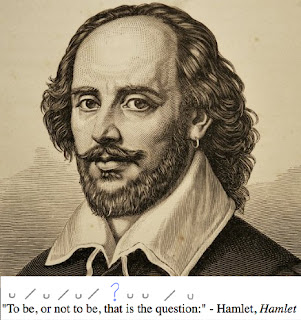Everything Shakespeare Ever Wrote
In honor of Shakespeare's birthday this year, here is a list of everything Shakespeare ever wrote. Yes, that's a lot of good stuff. Let's dive into it.
Note: the links in this page direct you to reliable, educational sites including the Poetry Foundation, Perseus by Tufts University, and another GEB post. The GEB receives no compensation of any kind from these links; they are included for reader convenience only.
The Sonnets
In 1609, Thomas Thorpe published published a quarto of 154 Shakespearean sonnets, written over Shakespeare's career. Among the most famous are Sonnet 18 ("Shall I compare thee to a summer's day"), Sonnet 29 ("When, in disgrace with Fortune and men's eyes"), Sonnet 116 ("Let me not to the marriage of true minds"), and Sonnet 130 ("My mistress' eyes are nothing like the sun").
In addition, Shakespeare wrote 6 sonnets into his plays: Romeo and Juliet, Henry V, and Love's Labour's Lost. A partial sonnet also appears in Edward III.
The Narrative Poems
Shakespeare published two long poems early in his career: Venus and Adonis (1593) and The Rape of Lucrece (1594). The two epic poems were dedicated to the Earl of Southhampton, a literary patron. Both received great attention and success, and were instrumental for Shakespeare in making his name in the literary world.
Venus and Adonis retells the myth of the goddess of love, Venus, who falls for the beautiful mortal Adonis. The myth is relayed comprehensively by Ovid in his Metamorphosis.
The Rape of Lucrece is also based on myth that appears in Ovid––this time, in Fasti. It narrates the rape of Lucretia by Tarquinius Sextus, the son of the Roman king Tarquinius Superbus. The epic poem ends in Lucretia's suicide.
Shakespeare was commissioned to write another, now obscure, narrative poem: The Phoenix and the Turtle. The poem was included in a collection of poetry centered around Robert Chester's Love's Martyr, published in 1601.
A Lover's Complaint was published along with Shakespeare's sonnets in the 1609 quarto. The poem focuses on a scorned lover who tells the story of her past love to an old man who finds her weeping by the edge of a river.
The Plays
Shakespeare wrote 37 plays, usually grouped into four categories––comedy, tragedy, romance, or history––and collaborated on even more (the exact number of collaborations is still in debate). All the plays that have survived and are at least partially attributed to Shakespeare appear in the list below. I have included publication and authorship notes for works not included in the First Folio, though the possible roles of collaborators in Shakespeare's plays are highly debated. In roughly chronological order (as presented by E.K. Chambers in 1930, with some additions), the plays are:
Henry VI, Part 2 (1590-91)
Henry VI, Part 3 (1590-91)
Henry VI, Part 1 (1591-92)
Richard III (1592-93)
The Comedy of Errors (1592-93)
Edward III (c. 1592): not included in the First Folio. Printed anonymously in 1596. Considered to be at least partially written by Shakespeare since the 1990s. Likely collaborators include Thomas Kyd, Christopher Marlowe, Michael Drayton, Thomas Nashe, and George Peele.
Titus Andronicus (1593-94)
The Taming of the Shrew (1593-94)
The Two Gentleman of Verona (1594-95)
Love's Labour's Lost (1594-95)
Romeo and Juliet (1594-95)
Richard II (1595-96)
A Midsummer Night's Dream (1595-96)
King John (1596-97)
The Merchant of Venice (1596-97)
Henry IV, Part 1 (1597-98)
Henry IV, Part 2 (1597-98)
Much Ado About Nothing (1598-99)
Henry V (1598-99)
Julius Caesar (1599-1600)
As You Like It (1599-1600)
Twelfth Night (1599-1600)
Hamlet (1600-01)
The Merry Wives of Windsor (1600-01)
Troilus and Cressida (1601-02)
All's Well That Ends Well (1602-03)
Measure for Measure (1604-05)
Othello (1604-05)
King Lear (1605-06)
Macbeth (1605-06)
Antony and Cleopatra (1606-07)
Coriolanus (1607-08)
Timon of Athens (1607-08)
Pericles, Prince of Tyre (1608-09): not included in the First Folio. Published in 1609 as a quarto. Modern scholarship suggests that the first 835 lines may have been written by George Wilkins.
Cymbeline (1609-10)
The Winter's Tale (1610-11)
The Tempest (1611-12)
Henry VIII (1612-13)
The Two Noble Kinsmen (1612-13): not included in the First Folio. Published in 1634. Attributed jointly to William Shakespeare and John Fletcher.
The Possible Plays: Highly Contested Authorship
There are several additional plays where Shakespeare's role is even further contested. They are listed below, with a brief summary of the authorship question:
The Spanish Tragedy (c. 1584-89): published anonymously. Likely written by Thomas Kyd. Includes some passages with printer's errors (the original manuscript is now lost). Some suggest that these printing errors result from a misreading of Shakespeare's handwriting.
Edmund Ironside (perhaps 1587): never published in its own era, but preserved in MS. Egerton 1994. The suggestion of Shakespeare as the author comes from the inclusion of many rare words invented by Shakespeare.
The London Prodigal (c. 1591-1604): published as a quarto in 1605. Attributed to Shakespeare on the title page of the only edition, but scholars have mostly rejected this attribution. Possible author that have been suggested include Ben Jonson, Thomas Dekker, John Marston, Michael Drayton, Thomas Heywood, and George Wilkins. No consensus.
Sir Thomas More (c. 1591-93): perhaps originally written by Anthony Munday and Henry Chettle, then likely revised by Thomas Heywood, Thomas Dekker, and William Shakespeare (perhaps among others). Evidence for Shakespeare's contribution, referred to as "Hand D," comes from handwriting analysis, style analysis, and spelling patterns. The British Library, which holds the document containing "Hand D," unequivocally holds that Shakespeare was "Hand D."
Arden of Faversham (1592): various suggestions for authors include William Shakespeare, Thomas Kyd, Christopher Marlowe, and Thomas Watson. Published by the Royal Shakespeare Company as partially attributed to Shakespeare in 2013, and included in the 2016 edition of The Oxford Shakespeare, with the author listed as Shakespeare with an anonymous collaborator.
A Yorkshire Tragedy (c. 1600-08): printed in 1608 and explicitly attributed to Shakespeare. Scholars have mostly rejected this attribution, suggesting instead Thomas Middleton as the author. May be a compilation of four pre-existing plays.
The Lost Plays
No copies survive of some of Shakespeare's plays, but there is evidence for publication of two more plays, listed below:
Love's Labour's Won (before 1598): published in 1603. Attributed to Shakespeare by his contemporaries. Possibly a sequel to Love's Labour's Lost, possibly an alternative title to a known Shakespeare play.
Cardenio (c. 1612-1613): history play performed by the King's Men in 1613. Attributed to William Shakespeare and John Fletcher in 1653. Source material is Miguel de Cervantes's Don Quixote, translated by Thomas Shelton by 1612.




Hello -- I appreciate and enjoy your fine article. (There's a wicked dangling participle there; here's my recommended tweak: "Considered since the 1990s to be at least partially written by Shakespeare.") Thanks and best wishes!
ReplyDelete